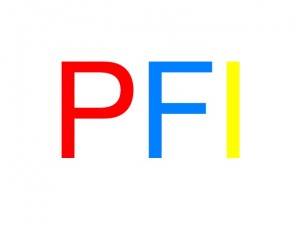Tory Hypocrisy on PFI Shines
This week it was reported that 61 PFI projects, worth a total of £6.9bn, have been taken forward since the general election. Despite criticising PFI in opposition and describing the scheme as “discredited”, chancellor George Osborne is due to sign off 40 of these projects this year.
This outstrips PFI projects initiated under Gordon Brown, who signed of 38 in 2009 and 32 in 2008. The capital value of these projects is over a billion pounds up on last year and the first year-on-year rise in capital value in over half a decade.
Since coming to power Business Secretary Vince Cable also appears to have changed his position on PFI. Following the credit crisis and the PFI bailouts Cable called PFI “a dishonest system of accounting, designed to hide taxpayers’ liabilities” and called for a “a simpler, more honest system of public investment for public projects.”
But Cable has played a key role in a government that has accelerated the use of PFI projects.
Faisal Islam, the economics editor of Channel 4 News reacted with bemusement, stating that the economic case for PFI has never been weaker. He said: “The Government can borrow money at under 4 per cent, and private companies can borrow money at 8 or 9 per cent. So why on earth would the government use a method to fund capital investment that has a base annual cost of double that of conventional procurement?”
Mark Hellowell, a PFI expert at Edinburgh University, explained why he thought PFI was still being pursued: “The government is very concerned to keep the headline rates of deficit and debt down, so it’s looking to use an increasingly expensive form of borrowing through an intermediary, knowing the investment costs won’t immediately show up on their budgets.”
The irony is not lost. The Tories have slammed New Labour over their accrual of “off balance sheet” debt, which involves an accounting trick that hides the full cost of capital expenditure programmes. Jesse Norman, Tory MP and organiser of the PFI rebate campaign recently wrote about off-balance sheet accounting: “The Brown-Balls attempt to fix the books has manifestly failed.” The coalition is now using the same accounting trick.
Osborne’s decision also comes in the wake of critical reports from the National Audit Office (NAO) and the House of Lords Economic Affairs Committee (HoLEAC). The NAO report said: “There were instances where PFI may have been used where there was no evidence that it was the best procurement route. Local authorities and health trusts used PFI because there was no realistic alternative, not because it represented best value for money.”
There is no realistic alternative to PFI because all three major parties still believe religiously in the power of markets and the efficiency of the private sector, even though reports, case studies and real life situations give evidence to the contrary.
Despite a weight of evidence supporting its ‘manifest failure’ the Coalition has proven itself just as zealously committed and ideologically bound to PFI. After it’s first year in power, it has increased public procurement under the scheme and continued to hide its full cost from the public.








